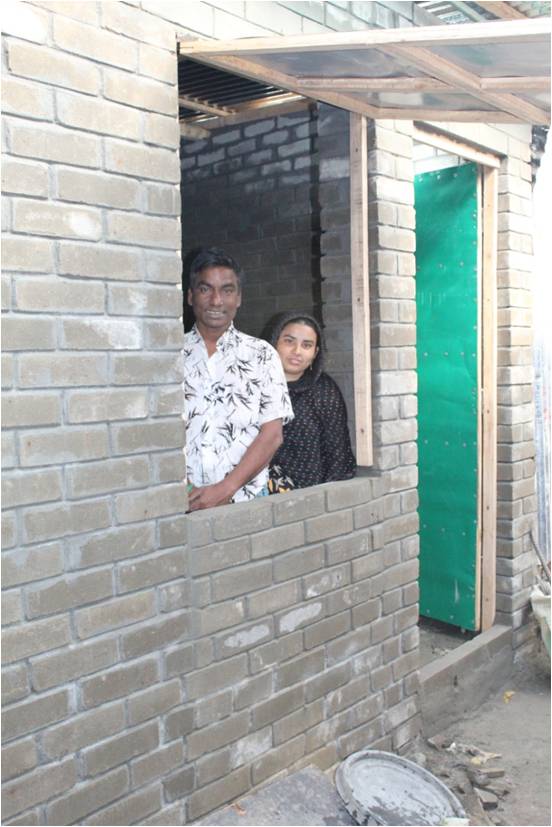Unbaked Bricks use soil, sand, cement, limestone powder and plaster of Paris for the construction of affordable housing in the expanding informal urban settlement area of Korail, Dhaka. The bricks are fire and heat resistant – critical in a city with a history of devastating fires caused by a high density of buildings, narrow roads, ageing water and electrical supply systems, and a prevalence of chemical factories. These bricks can be made by the community, in situ, removing transportation costs.
Over the past few years, hundreds of people have perished in building fires in Dhaka, the most densely populated city in the world. Poor infrastructure, inadequate safety regulations, narrow roads and ageing water and electrical supply systems mean residents and workers experience ongoing risk. The majority of housing in Korail, the largest informal settlement area in Dhaka, is made of corrugated iron and wood. As well as being vulnerable to fire, temperatures in these residences are more than 40 degrees Celsius making it impossible for families to stay indoors during the daytime.
Al Romania Sana, an architecture student at the American International University of Bangladesh, sought to use her skills to improve the living conditions of people in the slum areas. Her solution was to develop a low-cost unbaked brick, which is environment-friendly, fire resistant and cooling. And, they can be made by the community themselves.
The bricks are comprised of soil, sand, cement, limestone powder and plaster of Paris. Sania tested the strength of her brick against industry standard criteria and discovered a perfect combination of ingredients for strength, durability, cooling properties and fire resistance. Her plan is to produce the bricks locally to construct affordable housing in the expanding informal urban settlement area of Korail – and in doing so, also generate local employment.
Working with people from Korail, Sania, has built a house that is occupied by a young family. The team has been testing the temperature variations in house and working with the occupants who have notes the interior is considerably cooler than their previous home. Visitors have also remarked on the coolness of the home, the family says. They are able to spend time inside during the day.
More detail about the innovation
Problem: In the densely-populated slum areas of Dhaka, residents are at risk from fires, excessive heat and poor living conditions.
Solution: A low-cost, unbaked brick which is environment-friendly and can be made by the community themselves. Current status: Supported by Udhvabani Lab
Target audience: Low income people in slums areas, brick manufacturing companies, governmental organisations and NGOs
Prospects: Expansion outside of Korail, and training and employment for marginalised groups commonly excluded from job markets.
About the Founder: Al Romana Sania is an Architecture student at the American International University of Bangladesh
Endorsements: The product has been tested by the University of Information Technology and Science and certified to be of equal strength as the conventional bricks
Read more about other innovations from the DEPP Innovation Labs.

